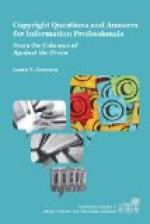In 1891, the Chace Bill was passed by Congress. One provision of this Bill enacts, that any citizen or subject of a foreign country, which has been declared by the President’s proclamation to permit citizens of the United States the benefit of copyright on substantially the same basis as its own citizens, can obtain copyright in the United States. The author obtaining such copyright is protected from piracy in the United States, or from importation of foreign reproductions into the United States. It is popularly understood in Canada that, before the passage of the Chace Bill, the Imperial authorities gave some concession, or made some change in the British Copyright Law, or entered into some International Agreement providing for reciprocity in the granting of copyright, in order to secure an arrangement with the United States. Such is not the case.
Only a few days ago, I read a report of an address upon copyright delivered to the Canadian Club by Mr. Thomas, a leading member of the firm of The Copp, Clark Company, from the published report of which I quote:—
“In turning to the conditions of copyright in the United States, Mr. Thomas stated that prior to 1891 there was no protection for British authors there, and his books were pirated at will. The result was so disastrously manifest that a conference was held, and an Act was passed giving them protection. That Uncle Samuel had both eyes open when the Act was passed and the agreement made, was shown when Mr. Thomas stated that one condition upon which the British author was given protection was that the book be printed and made in the United States, and that it be published prior to or simultaneously with foreign publication. This action of the Americans was contrasted with that of the British, who, while they demand the making and publication of a book in Britain to ensure the protection of copyright, yet construe the Act so as to allow it to be possible to have the book made in the United States and then have a sample sent to Stationers’ Hall, London, which sending allows the work to be entered as published in England. Mr. Thomas said that the United States was the best book market in the world. He pointed out that the Americans, being aware of this, compelled the outside authors to have their books published in the United States. Mr. Thomas was applauded when he said: ’There is not a single book made outside the United States as a result of this Act, for if you wish to secure the American copyright you have to have your book made there. What is sauce for the goose is not sauce for the gander, for we do not compel books to be published here in order to secure the British and Canadian copyright.’”
There is no foundation for these statements of Mr. Thomas in regard to the action of the United States. The Imperial authorities gave no concession to secure the passage of the Chace Bill, made no change in British Copyright Laws, entered into no agreement, and Uncle




